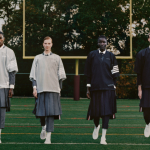
Staging of a football fanatic
5 different ways to show the love for the game
December 21st, 2016
There is a reason behind, a kind of paradox, about the bond between football and cinema, quite understandable but not without some issue, especially considering all the different subjects that the cinema get on loan from real life, year after year, since that first train came at the Ciotat station, in 1895, 28 of December. That paradox comes out while we are looking for the way to describe a game, and that way should be at the same time true and touching, in that moment we understand how hard that description could be. This distinctive trait that soccer generates, as cinema interested object, is sharpen if we consider how much it is a classical – sometimes artistic – representation, built in a known space with a some repeated sets. It has been possible to create a deconstructed gravitational perspective in “2001: Space Odyssey” universe, and so why is it so hard to make a believable and artistic soccer game on the screen? Why it has been possible to joke about the death of a necrophiliac guy and his old lover, an hippie who doesn’t «believe in drive license», and it’s so difficult to create the injury feeling or a defeat desperation?

Slightly different is to describe which is around a football game. That’s each feeling and event before, during and after the single play. In that case we are able to take a shot, talking about something which is both real and artistic. Because is the passionate behavior, some kind of religious obsession over and over again, which creates many perfect characters; mass media interest that surrounds players and managers is important too, of course, leading the screenplay to the fiction. The interest is moved to another object, is more or less as the camera is focus on someone’s astonished look while He is seeing a wonderful painting; We don’t look at the object, but the way it creates the feelings.
Eric Bishop (“Looking for Eric”)

Ken Loach is so important in a cinephile’s culture and life. Some of his movies are a kind of recap about social drama and hoping human links. In this movie He uses the guardian angel narrative device, something new in Loach movies. It has been used in the only possible way: the character comes to help the main character, a Manchester postman – one of that kind of city perfect to Loach theories – Who is thinking about his unstable sides’ life: in his job, in relationship. The only anchor seems some memories about Eric and Manchester games. Games which He can remember better than Cantona.
Paul Ashworth ("Fever Pitch")

Arsenal is like great English teams cinderella. Beautiful soccer place, spectacular and open-minded, but so unstable and emotional. Many talented players without that competitive angry essential to win the Premier League. Paul is our dreams professor: unconventional but so important in kids education. His obsession about London team drives him to put aside people, as that link with his team is the last childhood corner.
Matt Buckner ("Hooligans")

In the eighties, the hooligans violence was a real issue for England. It has been the wrong emotional passion translation in basic and violent instinct, leading to something like “The Warriors”. In this movie the “yankee”, the main character Matt has this belonging craving since the beginning, He needs to belong to a group – it is the reason (not just the money) why He is expelled from Harvard. And We have all the essential feelings: jealousy and envy, blind faith, redemption desire after something wrong as the betrayal. The tragic structure is more important than the English humor, but is the violence, verbal as well, the main object. And the heavy metal soundtrack is perfect to express that feeling.
Six Iranian supporters ("Offside")

In this movie, made from A to Z by Iranian director Panahi – winning Silver bear in Berlin – the soccer is used to describe the complicated women conditions in some countries. A six women Iranian supporters decided to break the ban going to a national game against the Bahrain, using man clothing. That kind of not aggressive rebellion act uses the soccer as provocation symbol to the irrational authority boundaries. As fake and irrational is the explanation about that prohibition: due to the potential swear word used by men in case of defeat.
Voiello Cardinal ("The young Pope")

As we see in "The Young Pope" the Cardinal display his faith to a team and a specific player (unfortunately betrayal personification) as We understand that rosary holding in his hand while He is watching the match is less important than the soccer t-shirt. And silent tragedy is described in his aimless steps made in that rich house, worse than a faith doubt. Orthodoxy religion – and rituals too – is alike observance to the sport; in Voiello’s case the choice is the comic way..












